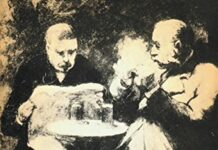
Ebook Info
- Published: 2004
- Number of pages: 516 pages
- Format: EPUB
- File Size: 1.97 MB
- Authors: Gustave Flaubert
Description
Sentimental Education begins with the hero – Frederic Moreau – leaving Paris and returning to the provinces and his mother. Part love story, part historical novel and satire it tells of how Moreau is driven by passion for an unattainable older woman. His ‘sentimental education’ turns out to be more of an anxious quest than a happy one, echoing Flaubert’s own life experience of unrequited love. Packed with vivid detail and characterised by its historical authenticity, the book was described by Flaubert as ‘the moral history of the men of my generation’.
User’s Reviews
Reviews from Amazon users which were colected at the time this book was published on the website:
⭐It may be that everything wrong with this edition of Gustave Flaubert’s Sentimental Education is tied to the translation. If so my most fervent plea is that you avoid This Kindle edition. It is annotated as having an “Un-credited Translation” and was taken from a 1922 edition. If this is Realism/Naturalism, I get why so many do not like that style. I have read others, including Madam B and believe that it can be very worthwhile. I do not get how this qualifies as other than too much about too many people not worth our time.Buried in here is an almost adolescent love story between a married woman, Mme Arnoux and our younger but not that young Frederic Moreau. Taking a moment to note reams of side stuff about revolution, much of it almost satirical except that none of it matters. In fact much of everything in this book is almost satirical, except that none of it matters. We meet Fredrick as his is an advanced student of the law, not esp well off and not in a rush to earn a leaving. Several years will pass during the novel, mostly because we are told that they do. Fredrick manages to use these years to accomplish nothing, and getting enough money that his plan is to continue to do not much of anything. A reasonable response to money. However, nothing about his maturity, emotional life or his interpersonal skills improve. It is not that he is a wastrel, just that he is supremely self-centered and completely lacking in any ability to make and stick to a decision, a cause, a love affair, a.. what else you got? To say the least, loyalty is not his leading characteristic. Much of his love life, lust life? Fiddling with about with women reads like a YA high school romance. I do, I won’t , may I will, she is cute, she is bad, I will get on her good side with gifts and repeat. For the record, his sleeping arrangements are perhaps more sophisticated than in the typical YA romance, but ever so discreetly written as not to offend. Remember Mme Arnoux? She is married to a prize lose. He is unworthy of her. Fredrick is unworthy of her. Most of the pages are you waiting about wondering if, when and how either one will get their comeuppances.Along the way he will dally along with a variety of women for hire, if the upper class of that service. Attend lavish banquets (please notice the 20 kinds of mustard) splurge in the expensive parts of café society attend what reads like a very delicately described orgy, or more exactly a bordello masked ball.Very exciting except that in this translation it is mostly dull.A fairly large support cast will come and go, rather like the money Fredrick gets and spends. Exactly what these people do besides fill pages is hard to explain. Or not worth explaining, take your pick.I do not like thee Sentimental Education.The reason why (perhaps) the translation tellsBut this I know and know too wellI do not like thee Sentimental Education
⭐I agree very much with Bruce Kendall’s review, particularly in relation to the novel’s relation to Stendhal, whose work Flaubert disparaged, as is only fitting among masters.I do not know how exactly _Madame Bovary_ has achieved a more premier position than _Sentimental Education_. The latter ranks, in my mind, as one of Western literature’s greatest achievements, bar none. The prose is incomparable (realism is never prosaic in Flaubert—witness the descriptions, for example, in the latter part of Chapter I, Part Three), and the attempt to reproduce the vicissitudes of one’s youth in what was in many ways the doldrums of a lost age of bourgeois self-indulgence can only be viewed as bitter if one has an inherent predisposition against honesty. If you read this work carefully, you will begin to comprehend the great questions assayed by Proust; but it is worthwhile to read Stendhal (who took little interest in finding the ‘mot juste,’ because he was cut of a different fabric) in conjunction with Flaubert because the two are like those great Titanic trees described in _Sentimental Education_, as they grew up under different circumstances, with vastly different temperaments, and each possessing his own unique genius.
⭐A definite master piece for readers that have some grasp of the classics. Taken in the context of a classic literary debate on human nature I could appreciate this book. a real window to the French zeitgeist of Flaubert’s times, and influential even on the present state of the French weltanschauung. He points at the nature of human beings, which was a bit disparaging of a verdict, or was it? Was it just the way things are in a nonjudgmental way. He gave some wonderful snap-shots of life in Paris around 1848 and seemed to give an objective view of a critical, if not underrated, moment in world history. Human nature is a conniving/duplicitous one and more than likely people become victims of their own connivances. Those who are singularly minded were rather boring and shallow. However, for Flaubert, like Goethe, friendship and love still, somehow, remain in tact as the highest virtue even through all the muck, egotism, and self-rightousness the book describes — but, one could argue, Flaubert arrives there by more legitimate means than some other great authors who have pointed in that direction.He seemed to be debating directly with the great works of the past, actually there are many parallels to Dickens “Great Expectations”. and Goethe’s “The Sorrows of Young Werther” These books are hinted at. It is stated that someone has no “expectations” (Dickens) and “The Sorrows” is more directly talked about on p. 413. Flaubert in debate with great authors, and not taken for his sadistic qualities, works quite well. This book, juxtaposed, to the two aforementioned books would be great topics of discussion; also Maslow “theories of peak experiences” seem apropos to mention in the context of a discussion on this book. Flaubert was saying, to me, that one is essentially born with a nature, or at the least it develops early on, and behaviors show themselves in various circular patterns of endeavor. The story of his youth, at the end, is a micro pattern of macro reoccurring events throughout the book. Frederic’s idealization of Madame Arnoux saves him from a worse fate than Wether’s idealization of Charlotte: Werther ends up committing suicide for his love, however, Frederic is possibly saved from a fate worse than death.Flaubert’s foray into the forest (323) it is filled with symbolism, and seemed like key pages that I didn’t grasp well. I am sure I will come back to this book again.
⭐Probably the Penguin translation is better; indeed, it could not be a lot worse. Some sentences were simply incomprehensible or meaningless in English. On many occasions, I didn’t know who ‘he’ was referring to, after a previous paragraph had mentioned two or three different characters.I was interested enough in Frederick’s character to finish the book, but it was often hard going. The immorality and decadence of the upper classes in Parisian society is on show, and not one character, apart from the saintly Madame Arnoux, is sympathetic at all. I found the stultifying social conventions of the time much less comprehensible than in Jane Austin, say. Knowledge of French history and political figures of the time is assumed by the author, although this can be safely glossed over without losing the thread of the story.I would struggle to recommend this book (or at least this version) to anyone really.
⭐A quality read from the master of the novel
⭐Excellent!
⭐An absorbing read which brings to life a society not too distant from our own.My only criticism would be the awkward nature of the translation.
⭐Sentimental Education is a kind of coming of age yarn set within the framework of French, chiefly Parisian, society. The subject of the book is leading character Frederick’s obsession with Madame Arnoux, an older married mother of two.Frederick leaves his provincial village of Nogent in an attempt to make his name in Paris, with vague notions of a career in law or perhaps as a local state official. However, his vague notions become even more vague when his path crosses that of Madam Arnoux. She is wife to a moderately successful journal editor, but Frederick determines that he shall worm his way into the Arnoux social circle and, eventually, Madam Arnoux’s affections.The pursuit of Arnoux is littered with obstacles – illicit affairs, shady business dealings, gossip, scandal and the staples of many French novels of the time: politics, revolution and the conventions of society.Sentimental Education is much less concerned with political events than Les Miserables, with only fleeting glances of revolution, which most of the central characters regard with indifference. It is less stinging in its examination of class in Parisian society that the salon-laden Father Goriot. There are references to wealth and poverty but only in connection with the central characters of the book, who seem to flit between debt, often between each other, inherited wealth and squandered savings.The key thread to the book is Flauberts examination and portrayal of Frederick’s all-consuming love for Madam Arnoux. The author’s description of the uncertainty, giddiness and heartache experienced by Frederick is so clear and beautifully described that it almost brings a note to the stomach of any reader who can recall their first teenage crush.Flaubert is wonderful when describing the courting process – especially the delicacy of a complex process made more fraught by the fact one of the party is married. The read is given an insight into the torment Frederick endures through stolen kisses, secret walks and loving glances.For this reader at least, the book fell away as the story progressed. Each character seemed to wrong another, with relationships descending into fueds and spiteful gossip. Love and brotherhood become polluted in a sea of bile and ill feeling.Frederick’s quest, which had at first seemed so naive and pure, is not immune from the bad odour and his ill humour makes him increasingly difficult for me to like, let alone root for. His random acts of unkindness and propensity for spoilt-brat tantrums made him tiresome.In conclusion, the thrill of the chase is enchanting and vivid. The problem is, the tangled web of the narrative left me feeling like I couldn’t care less if the quest were fulfilled.
Keywords
Free Download Sentimental Education (Penguin Classics) in EPUB format
Sentimental Education (Penguin Classics) EPUB Free Download
Download Sentimental Education (Penguin Classics) 2004 EPUB Free
Sentimental Education (Penguin Classics) 2004 EPUB Free Download
Download Sentimental Education (Penguin Classics) EPUB
Free Download Ebook Sentimental Education (Penguin Classics)




